 |
 |
 |
 |
James W. Balsiger Ph.D.
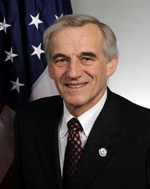 Acting Assistant Administrator of Fisheries Acting Assistant Administrator of Fisheries
Dr. Balsiger was appointed the Acting Assistant Administrator for
Fisheries on February 17, 2008. He oversees the management and conservation of marine fisheries and the protection of marine mammals, sea turtles and coastal fisheries habitat within the United States exclusive economic zone. The National Marine Fisheries Service protects and preserves the Nation’s living marine resources through scientific research, fisheries management, law enforcement, and habitat conservation.
Dr. Balsiger began his career with NOAA in 1977 and has held other leadership roles in the National Marine Fisheries Service during his tenure. Since May 2000, he has served as the Alaska Regional Administrator in Juneau, Alaska. He was the Regional Science and Research Director at the Alaska Fisheries Science Center in Seattle, WA, where he also served as Deputy Science Director from 1991 through 1995. Prior to that, he was the Program Leader for the Status of Stocks Task within the Center’s Resource Ecology and Fisheries Management Division from 1977 to 1991. He holds a Bachelor of Science degree in Forestry from Michigan Technological University in Houghton, Michigan; a Master of Science degree in Forest Silviculture from Purdue University in Lafayette, Indiana; and a Ph.D. in Quantitative Ecology and Natural Resource Management from the University of Washington in Seattle. In 2002, President Bush awarded him a Meritorious Award for sustained superior accomplishments throughout his career.
John Oliver
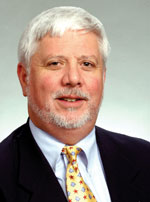 Deputy Assistant Administrator for Operations Deputy Assistant Administrator for Operations
Mr. Oliver serves as the Deputy Assistant Administrator for Operations at NOAA Fisheries, a position he has held this position since January 2001. As the Principal Deputy for NOAA Fisheries he serves as the Chief Operating Officer responsible for the day-to-day management of the Agency's operations. From 1997 to 2000, Mr. Oliver served as the Chief Financial Officer/Chief Administrative Officer for NOAA's National Ocean Service. Prior to that position, he was the Director of the NOAA Fisheries Management and Budget Office. Mr. Oliver has more than 30 years of experience in Department of Commerce/NOAA management and policy positions.
Samuel D. Rauch 
Deputy Assistant Administrator for Regulatory Programs
Mr. Rauch began serving as Deputy Assistant Administrator
for Regulatory Programs at NOAA Fisheries in June of 2006.
In this capacity he oversees all of NOAA Fisheries' regulatory
actions, including those to support protected resources, sustainable
fisheries, and habitat conservation. From January 2004 to June
of 2006, Mr. Rauch served as the Assistant General Council
for Fisheries where he supervised a team of attorneys, paralegals,
and support staff responsible for providing legal counsel to
the NOAA Fisheries. Prior to joining NOAA Fisheries he served
as a trial attorney and the Assistant Section Chief for the
Wildlife and Marine Resources Section of the Environment and
Natural Resources Division for the United States Department
of Justice. In this role, he either conducted or managed most
of the litigation brought against NOAA Fisheries Service. The
immediate future will bring new challenges for him as the Magnuson-Stevens
Fishery Conservation and Management Reauthorization Act of
2006, signed into law on January 12, 2007. Mr. Rauch holds
a J.D. from Northwestern School of Law of Lewis & Clark
College , and M.S. from University of Georgia , and a B.A.
from University of Virginia . He has also been the recipient
of many honors during his career, including: NOAA General Counsel's
Award (1998, 2002, 2004, 2005); and Department of Justice Special
Achievement Awards (1997, 1998, 2000, 2002).
Dr. Steve Murawski
 Director
of Scientific Programs and Chief Science Advisor Director
of Scientific Programs and Chief Science Advisor
Dr. Murawski serves as Director of Scientific Programs and
Chief Science Advisor for NOAA Fisheries. He is responsible
for about 30 laboratories, eight offshore research vessels,
and 1,400 staff throughout the United States. His organization’s
mission is to provide the scientific basis for conservation
and management of living marine resources and their ecosystems.
Dr. Murawski was previously the Director of the Office of Science
and Technology, a position he held since October 2004. Prior
to coming to NOAA Fisheries headquarters, he served as Chief
Stock Assessment Scientist for the Northeast Fisheries Science
Center in Woods Hole, Massachusetts (1990–2004). His
research background is in fisheries biology and stock assessment.
He has published in several journals, including the Canadian
Journal of Fisheries and Aquatic Sciences, Marine Ecology Progress
Series, Bulletin of Marine Science, and Ecological Applications.
During his career, Dr. Murawski has been a key representative
on several committees and councils. His current roles include
official U.S. delegate to the International Council for the
Exploration of the Sea, member on the Global Ocean Ecosystems
Dynamics (GLOBEC) Program Steering Committee, and Project Manager
for NOAA Fisheries’ Ecosystem Management Pilot Projects.
Dr. Murawski has also been the recipient of many honors during
his career, including: NOAA Fisheries Employee of the Year
(2002); three NOAA Bronze Medal Awards (1994, 1999, and 2003);
Distinguished Alumni Award from the Department of Natural Resource
Conservation, University of Massachusetts (2003); and the David
Belding Marine Conservation Award from the Massachusetts Divisions
of Marine Fisheries (2004). He received his Ph.D. from the
University of Massachusetts–Amherst.
OFFICE OF THE ASSISTANT ADMINISTRATOR
Rebecca Lent, Ph.D.
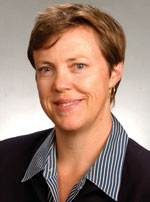 Director,
Office of International Affairs Director,
Office of International Affairs
Dr. Lent began serving as Director of the new Office of International
Affairs, in July 2005. The new office was created due to the
increasing importance of international fisheries issues. Previously,
Dr. Lent was Deputy Assistant Administrator for Regulatory
Programs at NOAA Fisheries, a position she held since 2001.
In that capacity, she reviewed all of NOAA Fisheries’ proposed
regulatory actions, including those to support protected resources,
sustainable fisheries, and habitat conservation in both the
national and international arenas. Dr. Lent joined NOAA in
1992, serving as the economist and later as the Chief of the
Atlantic Highly Migratory Species Management Division. She
has broad experience in dealing with a wide variety of controversial
fishery management issues affecting fishermen, conservationists,
business, and communities. Dr. Lent was appointed Southwest
Regional Administrator in 2000 and in this capacity directed
NOAA’s fisheries management and science programs in the
southwestern United States, Hawaii, and the U.S. Trust Territories.
She earned her Ph.D. in resource economics from Oregon State
University in 1984 and holds a master’s degree in economics
(1978) and a bachelor’s degree (1975).
Tim Hansen
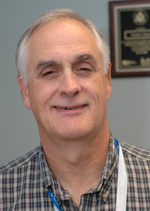 Director,
Seafood Inspection Program Director,
Seafood Inspection Program
Mr. Hansen began his career in the seafood processing business
holding several quality assurance and production positions
in Washington State and Alaska . In 1985 he joined the National
Marine Fisheries Service Inspection Program as an intermittent
inspector in Seattle , WA . He was quickly transferred to Los
Angeles California and was promoted to Deputy Regional Chief
Inspector in 1987 and held that position through 1991. In 1992
he was selected to be the Director of Field Operations for
the Inspection Program. During this period he worked with NMFS
staff and FDA under a proposed joint voluntary HACCP program
that was important to the implementation of HACCP concept to
the seafood industry for both agencies. In 1996 he became the
Director of Technical Services for the Seafood Inspection Program
leading a group of trainers and scientist who supported the
program and industry. In 1998 Mr. Hansen joined the FDA Office
of Seafood at the beginning of the implementation phase of
the seafood HACCP regulation. He became a branch chief in 1999
and a Division Director in 2003. During this period he was
heavily involved in Codex Fish Committee work and the international
implementation of the seafood HACCP regulation (21 CFR 123).
In August 2006 Mr. Hansen became the Director of the NOAA Seafood
Inspection Program.
Larry Tyminski
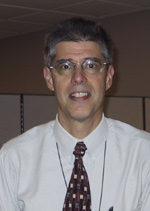 Chief
Information Officer Chief
Information Officer
Mr. Tyminski is the Chief Information Officer for NOAA Fisheries.
One of Mr. Tyminski's principal responsibilities is to ensure
alignment with the Agency’s business and strategic goals
by providing oversight and direction of information technology
(IT), information infrastructure, and telecommunications programs
within headquarters and 12 Regional Science Centers and labs.
He is responsible for local- and wide-area network operations,
IT strategic planning, and IT security. His duties include
the management of a multi-million-dollar IT budget, oversight
of a staff of IT professionals, Internet and Intranet operations,
telecommunications management, and project management for various
software and hardware projects. He serves as the NOAA Fisheries
representative to the Department of Commerce CIO Council, outside
organizations, and other Federal agencies for IT initiatives.
Prior to joining NOAA Fisheries, Mr. Tyminski was the Deputy
CIO for the Bureau of Economic Analysis. He has held IT management
positions with the National Weather Service, Grumman Aerospace
Corporation, Raytheon Company, and Sanders Associates (Lockheed).
He received his M.B.A. from George Washington University and
holds a B.S. degree from the University of Buffalo.
Dr. Mark Holliday
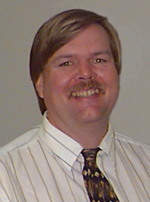 Director,
Office of Policy Director,
Office of Policy
Dr. Holliday serves as the Director of the NOAA Fisheries
Office of Policy, after helping re-establish the function in
the Directorate in 2003. His prior service to the Agency includes
an 11-month detail as the Chief Financial Officer/Chief Administrative
Officer in 2002, and a career progression in the Office of
Science and Technology beginning in 1981 and ending as Chief
of the Fisheries Statistics and Economics Division. During
his tenure he helped organize or lead NOAA-wide strategic initiatives
in the planning and formulation of budgets, and created new
programs in information technology, social sciences, and fisheries-dependent
observing systems. His training includes a wide range of disciplines,
including fisheries biology and resource economics. He received
his Ph.D. in marine studies in 1981 from the University of
Delaware, and holds a master’s degree in marine and environmental
science from Long Island University and a bachelor’s
degree in biology from SUNY at Stony Brook.
Dr. Michael Rubino
 Manager/NOAA
Aquaculture Program Manager/NOAA
Aquaculture Program
Dr. Michael Rubino is the manager of the National Oceanic and
Atmospheric Administration's Aquaculture Program. He joined NOAA
in late 2004 to lead NOAA's renewed commitment to marine aquaculture.
Most recently, Dr. Rubino was the manager of New Funds Development
for the World Bank's Carbon Finance Group. In the 1990s, Dr.
Rubino was at the International Finance Corporation, a private
sector affiliate of the World Bank, where he developed renewable
energy and biodiversity investment funds. Earlier he was the
CEO of Bluewaters, Inc., an aquaculture R&D company, and
a partner in Palmetto Aquaculture, a shrimp farm in South Carolina
. Dr. Rubino also served as vice-chairman of the State of Maryland
's Aquaculture Advisory Committee. He holds a Ph.D. in Natural
Resources from the University of Michigan.
Natalie Huff
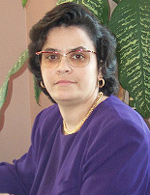 Equal
Employment Opportunity (EEO)/Diversity Manager Equal
Employment Opportunity (EEO)/Diversity Manager
Ms. Huff has been a Department of Commerce employee since 1978.
She has worked with the Employee Development Division, one of
the many offices in the Office of the Secretary’s Personnel
Office. In 1988, she joined the International Trade Administration
as an Employee Development Specialist/Awards Officer. In this
capacity she was responsible for the development of several training
programs and the management of the ITA Awards Program. In 1992,
she was selected by NOAA Fisheries to serve as a Management Program
Analyst in the Office of Management Services. In this capacity
she managed the training program, awards, and many day-to-day
management functions. In 1995 she was appointed to serve as the
National Program Manager for EEO and later as the Human Resources
Team Leader in the Operations, Management, and Information Office.
Following the inception of the NOAA Diversity Office, Natalie
was appointed by the Assistant Administrator to serve as the
National Program Manager for EEO and Diversity.
HEADQUARTERS OFFICE DIRECTORS
Alan Risenhoover
 Director,
Office of Sustainable Fisheries Director,
Office of Sustainable Fisheries
In 2006, Mr. Risenhoover began his service as the Director
of the Office of Sustainable Fisheries in Silver Spring, Maryland.
In this role, he is responsible for NOAA Fisheries Service
headquarters activities relating to the Magnuson-Stevens Fishery
Conversation and Management Act and other laws, and oversees
more than 90 staff in a number of locations around the country.
The Office oversees Atlantic highly migratory species (bluefin
tuna, swordfish, billfish, shark) management, domestic fisheries
re gulation coordination, fisheries policy development and
implementation, Atlantic Coastal Act implementation, outreach
and constituent services, and food safety risk analysis . Beginning
his career with NOAA in 1989, he has held several key positions
within the agency including Deputy Director within the Office
of Sustainable Fisheries (2004-2006), Deputy Chief Financial
Officer/Deputy Chief Administrative Officer (Deputy Director
of the Office of Management and Budget, 1999 - 2004), Fisheries
Team Lead for Legislative Affairs (1994 - 1999), and assignments
within the Offices of Protected Resources and Habitat Conservation.
He received his bachelor's degree in aquatic zoology from Colorado
State University and a master's degree in fish and wildlife
sciences from Texas A&M University.
Dale Jones
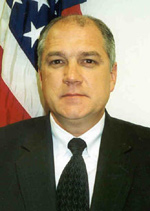 Chief,
Office of Law Enforcement Chief,
Office of Law Enforcement
Mr. Jones became the Chief of the NOAA Fisheries Office for
Law Enforcement in May 2000. His previous law enforcement experience
includes 5 years as a municipal Chief of Police for the City
of Hagerstown, Maryland; 4 years as the Director of Police
and Fire Services with the City of Warren, Pennsylvania; and
12 years as a police officer, supervisor, and member of the
command staff of the Arvada Police Department in Arvada, Colorado.
In addition to and during his tenure with these communities,
Mr. Jones has served as a peer advisor to the State of Pennsylvania,
working with other municipal police chiefs to review their
departmental operations and administration. He has also served
as an assessor for the Commission on Accreditation for Law
Enforcement Agencies (CALEA) and as an adjunct faculty member
of the Hagerstown Community College, teaching courses in the
criminal justice program. He holds a master's degree in foundations
of bilingual and multicultural education from the University
of Colorado–Denver and a bachelor’s degree with
a double major in criminology and sociology from the Indiana
University of Pennsylvania.
Jim Lecky
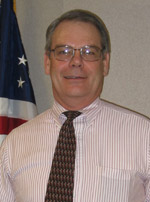 Director,
Office of Protected Resources Director,
Office of Protected Resources
Jim Lecky is the Director of the Office of Protected Resources.
This headquarters Office is responsible for national leadership,
policy development, and program implementation for NOAA's protected
resource conservation mandates, primarily the Marine Mammal
Protection Act (MMPA) and Endangered Species Act (ESA). Previously
he served as the Senior Advisor for Intergovernmental Programs
for NOAA Fisheries, where his focus was on improved intergovernmental
coordination on a number of cross cutting programs, such as
the Healthy Forest Initiative, counter part regulations to
improve implementation of the Endangered Species Act consultation
process, and several multi-agency conservation efforts. He
served as the Assistant Regional Administrator for Protected
Resources in the Southwest Region from 1990 through 2004. He
supervised staff in four field locations across California
who were involved largely in restoration and management of
listed salmon populations from San Diego County north to the
Oregon Border. He has a degree in biology form California State
University, Fullerton, and has conducted graduate research
on biology of eastern Pacific dolphins. He joined NOAA Fisheries
in 1977 as a fisheries biologist in the Southwest Region's
Marine Mammal and Endangered Species Program. In 1986, he began
working on the restoration of depleted salmon runs with the
development of a ten point restoration program for winter-run
chinook salmon in the Sacramento River, California. His interests
continue to include ecosystem restoration, salmon recovery,
and resolution of endangered species conflicts with human activities.
Gary Reisner
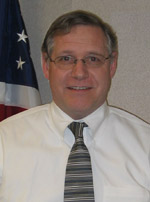 Director,
Office of Management and Budget Director,
Office of Management and Budget
Gary Reisner serves as the NMFS Chief Financial Officer responsible
for advising the Assistant Administrator and agency leadership
on the agency-wide objectives, measures of accomplishment,
and the distribution of resources among the agency's management
units. In addition to these planning and monitoring elements,
he oversees the Office of Management and Budget, which provides
for the agency's administrative processes, budget formulation
and execution, strategic planning, performance management and
oversight, facility and safety management, grants coordination,
audit coordination and oversight development, human resource
management, and loan financing services. Prior to his current
position, he worked at the White House Office of Management
and Budget where he oversaw policy and program development
of the NOAA budget and the performance of the Commerce Department
under the President’s Management Agenda. He brings experience
in developing and implementing government-wide natural resources
initiatives including Lands Legacy and the Conservation Spending
Category, recommendations of former President Bush’s
Task Force on Outer Continental Shelf Oil and Gas Development,
and guiding development and review of the first Interior Department
Strategic Plan. Mr. Reisner has a Masters of Science degree
in natural resource economics and over twenty years of Federal
service devoted to advancing public policy on natural resource
management, and related science. He has been involved with
and a supporter of research that fosters economic and politically
feasible solutions to many of the Nation’s environmental
and management conflicts.
Patricia A. Montanio
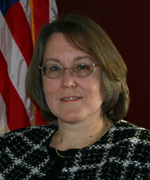 Director,
Office of Habitat Conservation Director,
Office of Habitat Conservation
Pat Montanio became Director of the Office of Habitat Conservation
in March 2006, where she oversees the conservation, protection,
and restoration of oceanic, coastal, estuarine, and riverine
habitats vital to our nation's marine fisheries. She is Manager
of the NOAA Habitat Program and a member of the NOAA Coral
Reef Conservation Program's senior management council. Pat
has served NOAA for over 20 years. Most recently, Pat was Chief
of the Office of Response and Restoration's Damage Assessment
Center in the National Ocean Service. There she was involved
in implementing the natural resource damage provisions of the
Oil Pollution Act and Comprehensive Environmental Response,
Compensation and Liability Act (Superfund) for NOAA. Prior
to that, she served as Deputy Director of the Office of Response
and Restoration. In both positions, she advanced the protection
and restoration of coastal resources by developing improved
strategies and partnerships, provided scientific guidance to
federal, state and local agencies on oil and chemical spills
and waste site clean-up decisions and promoted the restoration
of natural resources affected by hazardous materials. Prior
to her stint in NOS, Pat was the Deputy Director of the NMFS
Office of Protected Resources. There she directed programs
for the conservation of marine mammals, endangered and threatened
species, and other species of concern. She led agency efforts
to develop new approaches to improve the implementation of
the Endangered Species Act, as well as a legislative proposal
under the Marine Mammal Protection Act establishing a new model
for managing interactions between marine mammals and commercial
fishing.
Dr. John Boreman
Director, Office of Science and Technology

Dr. Boreman is the Director of the NMFS Office of Science and
Technology, moving in September 2006 from his previous position
as Science and Research Director - Northeast Fisheries Science
Center (NEFSC). Other positions held during his 33 years of service
to the Federal Government include Northeast Regional Power Plant
Specialist for the U.S. Fish and Wildlife Service (FWS), Aquatic
Ecologist for the FWS National Power Plant Team, Senior Assessment
Scientist for NEFSC, Chief of Research Coordination for NEFSC,
Director of NOAA's Cooperative Marine Education and Research
Program and Adjunct Professor at the University of Massachusetts
- Amherst, and Deputy Director of NEFSC. His research interests
included population dynamics of coastal migratory fishes, and
impacts of coastal development on fisheries resources. He received
his Ph.D. and M.S. degrees from Cornell University and his bachelor's
degree from SUNY College of Environmental Science and Forestry.
REGIONAL OFFICES
Bob Lohn
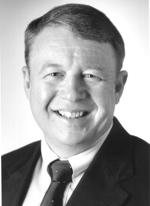 Regional
Administrator, Northwest Region Regional
Administrator, Northwest Region
Mr. Lohn is a native of Montana. He attended Harvard University,
served as an officer in the Navy, then returned for a law degree
from the University of Montana. Following graduation, he became
counsel for the Governor of Montana, taught law at the University
of Georgia, became chief of the legal staff at the U.S. Court
of Appeals for the Ninth Circuit in San Francisco, and later
practiced law in the Bay area. In 1987, Bob was chosen as General
Counsel for the Northwest Power Planning Council in Portland,
Oregon, where he began working with fish and wildlife issues
in the Columbia River basin. In 1994, he left the Council to
manage fish and wildlife activities for the Bonneville Power
Administration, which implements the Council’s program
and addresses Endangered Species Act requirements for the regional
hydropower system. In 1999, Mr. Lohn returned to the Council
as Fish and Wildlife Director. He was appointed Northwest Regional
Office Administrator in October 2001.
Rodney R. McInnis
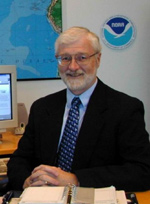 Regional
Administrator, Southwest Region Regional
Administrator, Southwest Region
Mr. McInnis is the Regional Administrator for NOAA Fisheries'
Southwest Region. He joined the Region in 1982 and has held
progressively more responsible positions prior to becoming
the Regional Administrator in 2004. Mr. McInnis earned an M.A.
in biology and a B.A. from San Francisco State University.
His graduate work was conducted through the graduate studies
program at the Moss Landing Marine Laboratories.
William L. Robinson
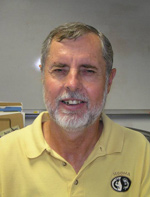 Regional
Administrator, Pacific Islands Region Regional
Administrator, Pacific Islands Region
Mr. Robinson is the Regional Administrator of the Pacific
Islands Region based in Honolulu, Hawaii. After beginning
his career with the Oregon Department of Fish and Wildlife,
he joined NOAA Fisheries in 1980. He served as Chief of Fisheries
Management for the Alaska Region and until recently was the
Assistant Regional Administrator for Sustainable Fisheries
in the Northwest Region. His responsibilities have included
administering Federal fisheries management and endangered
species programs in Alaska and the U.S. West Coast, and representing
NOAA Fisheries on the Pacific Fishery Management Council,
Pacific Salmon Commission, and International Pacific Halibut
Commission. He has also represented NOAA Fisheries in a professional
exchange with the Australian Fisheries Service, where he
helped design and implement an Individual Transferable Quota
program in the Australian southern bluefin tuna fishery,
the first such program in that country. He has worked closely
with Native American tribes, the West Coast and Alaska fishing
industry, and environmental groups to promote resource conservation
and sustainable fisheries management. He received his B.S.
in fisheries from Oregon State University.
Patricia Kurkul
Regional
Administrator, Northeast Region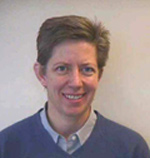
Ms. Kurkul is the Regional Administrator for the Northeast
Regional Office (NERO). Her primary expertise is in fishery
management. Prior to her current position, Ms. Kurkul served
as the director of the NERO Sustainable Fisheries Division,
where she had previously served as fishery policy analyst.
She has worked for NOAA Fisheries since 1980. Ms. Kurkul
has a background in economics and holds an M.S. in resource
economics from the University of Rhode Island.
Dr. Roy E. Crabtree
Regional
Administrator, Southeast Region
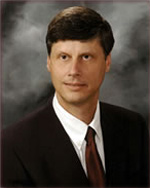 Dr. Crabtree has served as Regional Administrator for the
Southeast Region since January 2003. Previously he served
as a senior research scientist at the Florida Marine Research
Institute. His managerial experience includes operating his
own fishing guide business in the Florida Keys and Everglades
National Park, serving as a Fishery Management Specialist
with NOAA Fisheries' Southeast Region, and, most recently,
serving as Director of the Division of Marine Fisheries with
the Florida Fish and Wildlife Conservation Commission. Spanning
more than 15 years of State and Federal Government service,
Dr. Crabtree has gathered broad experience as a natural resource
manager. He has authored or coauthored 36 scientific publications
and six selected unpublished assessments, and has provided
input on numerous fisheries management plans for the Gulf
of Mexico, South Atlantic, and Caribbean. He earned his doctorate
in marine science from the College of William and Mary in
1984, a master's degree in marine science from the University
of South Carolina in 1978, and a bachelor's degree in biology
from Furman University in 1976. Dr. Crabtree has served as Regional Administrator for the
Southeast Region since January 2003. Previously he served
as a senior research scientist at the Florida Marine Research
Institute. His managerial experience includes operating his
own fishing guide business in the Florida Keys and Everglades
National Park, serving as a Fishery Management Specialist
with NOAA Fisheries' Southeast Region, and, most recently,
serving as Director of the Division of Marine Fisheries with
the Florida Fish and Wildlife Conservation Commission. Spanning
more than 15 years of State and Federal Government service,
Dr. Crabtree has gathered broad experience as a natural resource
manager. He has authored or coauthored 36 scientific publications
and six selected unpublished assessments, and has provided
input on numerous fisheries management plans for the Gulf
of Mexico, South Atlantic, and Caribbean. He earned his doctorate
in marine science from the College of William and Mary in
1984, a master's degree in marine science from the University
of South Carolina in 1978, and a bachelor's degree in biology
from Furman University in 1976.
Doug Mecum
Acting Regional Administrator, Alaska Region
 Mr. Mecum is the Deputy Regional Administrator for the Alaska Region and is currently serving as the Acting Regional Administrator while Dr. Jim Balsiger is at NOAA Fisheries Headquarters serving as the Acting Assistant Administrator. He started his career as a fisheries biologist for the Wyoming Game and Fish Department, but moved to Alaska in 1981 to pursue his graduate education. In 1983 he began work with the Alaska Department of Fish and Game where he served in various positions culminating as Director of the Division of Commercial Fisheries. He has also served on many fisheries-related commissions and committees, including the North Pacific Fishery Management Council, the Pacific States Marine Fisheries Commission, the Exxon Valdez Oil Spill Trustee Council, committees of the Pacific Salmon Commission, and the Marine Stewardship Council. He graduated with honors and a bachelor’s degree in wildlife from the University of Wyoming. Mr. Mecum is the Deputy Regional Administrator for the Alaska Region and is currently serving as the Acting Regional Administrator while Dr. Jim Balsiger is at NOAA Fisheries Headquarters serving as the Acting Assistant Administrator. He started his career as a fisheries biologist for the Wyoming Game and Fish Department, but moved to Alaska in 1981 to pursue his graduate education. In 1983 he began work with the Alaska Department of Fish and Game where he served in various positions culminating as Director of the Division of Commercial Fisheries. He has also served on many fisheries-related commissions and committees, including the North Pacific Fishery Management Council, the Pacific States Marine Fisheries Commission, the Exxon Valdez Oil Spill Trustee Council, committees of the Pacific Salmon Commission, and the Marine Stewardship Council. He graduated with honors and a bachelor’s degree in wildlife from the University of Wyoming.
SCIENCE CENTERS
Dr. Douglas DeMaster
Science Director, Alaska Fisheries Science Center
 Dr. Douglas DeMaster became Science and Research Director of the Alaska Fisheries Science Center in October 2001. Previously he served as Director of the National Marine Mammal Laboratory (NMML), leader of the NMML Cetacean Assessment and Ecology Program, and head of the Marine Mammal Division at the Southwest Fisheries Science Center. Dr. DeMaster is recognized as one of the leading experts on marine mammal stock assessment and marine mammal–fishery interactions. He has published more than 65 peer-reviewed publications on marine mammals and an additional 38 reports related to the population ecology of marine mammals. In cooperation with other NOAA Fisheries scientists, Dr. DeMaster helped develop the system under which marine mammals are managed in the United States under the Marine Mammal Protection Act. Since receiving his Ph.D. from the University of Minnesota in 1978, he has been an active member of the academic community. He was an Adjunct Professor at the Scripps Institution of Oceanography, where he taught courses on marine mammal biology and population dynamics. Since 1994, Dr. DeMaster has been an Affiliate Professor at the University of Washington’s School of Marine Affairs and more recently the School of Aquatic and Fishery Sciences. He also served as the President of the Society for Marine Mammalogy, the Chair of the Scientific Committee of the International Whaling Commission (IWC), and is currently the deputy Commissioner for the US delegation at the IWC. Dr. Douglas DeMaster became Science and Research Director of the Alaska Fisheries Science Center in October 2001. Previously he served as Director of the National Marine Mammal Laboratory (NMML), leader of the NMML Cetacean Assessment and Ecology Program, and head of the Marine Mammal Division at the Southwest Fisheries Science Center. Dr. DeMaster is recognized as one of the leading experts on marine mammal stock assessment and marine mammal–fishery interactions. He has published more than 65 peer-reviewed publications on marine mammals and an additional 38 reports related to the population ecology of marine mammals. In cooperation with other NOAA Fisheries scientists, Dr. DeMaster helped develop the system under which marine mammals are managed in the United States under the Marine Mammal Protection Act. Since receiving his Ph.D. from the University of Minnesota in 1978, he has been an active member of the academic community. He was an Adjunct Professor at the Scripps Institution of Oceanography, where he taught courses on marine mammal biology and population dynamics. Since 1994, Dr. DeMaster has been an Affiliate Professor at the University of Washington’s School of Marine Affairs and more recently the School of Aquatic and Fishery Sciences. He also served as the President of the Society for Marine Mammalogy, the Chair of the Scientific Committee of the International Whaling Commission (IWC), and is currently the deputy Commissioner for the US delegation at the IWC.
Dr. Usha Varanasi
 Science
Director, Northwest Fisheries Science Center Science
Director, Northwest Fisheries Science Center
Dr. Varanasi is Science and Research Director of the Northwest
Fisheries Science Center, a position she has held since 1994.
With almost 30 years of service in NOAA, she has dedicated
much of her career to applying chemistry to critical biological
questions, advancing our understanding and the application
of science to regulatory, management, and public policy decisions.
Her research on how marine organisms accumulate and process
contaminants revolutionized the field and led to the development
of techniques that reduce the impacts of pollution on fisheries
resources and ensure that seafood is safe for human consumption.
Dr. Varanasi has published articles in many peer-reviewed journals
and has edited two books. She serves on many expert committees
and scientific boards and is the recipient of a number of distinguished
awards, including the Presidential Rank Award for Meritorious
Service and Department of Commerce Gold Medal. She is deeply
committed to the open communication of science, the education
of students in the sciences, and the mentoring of young leaders.
Dr. Varanasi received her Ph.D. in organic chemistry from the
University of Washington, where she now holds an adjunct professorship;
an M.S. degree in chemistry from the California Institute of
Technology; and a B.Sc degree from Bombay University in India.
Dr. Norman Bartoo
Acting Science Director, Southwest Fisheries Science Center
 Dr. Bartoo has been Acting Science and Research Director for the Southwest Fisheries Science Center since February 2008. His previous positions have included Deputy Science and Research Director for the Southwest Fisheries Science Center, 2004-2008. Prior to becoming the Deputy Director he served in a variety of senior management and scientific assignments at the Southwest Fisheries Science Center. Dr. Bartoo’s focus has been on stock assessment and population dynamics of highly migratory species for over 30 years. He holds a Ph.D. in fish population dynamics from the University of Washington, as well as a M.S. degree in fisheries statistics and a B.Sc in fisheries management and administration. He is author or co-author of over 50 scientific publications and served as the Scientific Editor for NOAA’s Fishery Bulletin and NOAA Professional Papers from 2003-2005. Dr. Bartoo has been Acting Science and Research Director for the Southwest Fisheries Science Center since February 2008. His previous positions have included Deputy Science and Research Director for the Southwest Fisheries Science Center, 2004-2008. Prior to becoming the Deputy Director he served in a variety of senior management and scientific assignments at the Southwest Fisheries Science Center. Dr. Bartoo’s focus has been on stock assessment and population dynamics of highly migratory species for over 30 years. He holds a Ph.D. in fish population dynamics from the University of Washington, as well as a M.S. degree in fisheries statistics and a B.Sc in fisheries management and administration. He is author or co-author of over 50 scientific publications and served as the Scientific Editor for NOAA’s Fishery Bulletin and NOAA Professional Papers from 2003-2005.
Dr. Samuel Pooley
Science
Director, Pacific Islands Fisheries Science Center
 Dr. Pooley is Science and Research Director of the Pacific
Island Fisheries Science Center. For the past 20 years he has
served as the Honolulu laboratory’s lead economist, with
responsibilities ranging from economic analysis of commercial
fisheries to evaluation of the benefits of recreational fisheries
and endangered species preservation. He has also published
papers on bio-economic analysis and alternative fishery management
and property rights regimes, including cooperative and corporate
management. Dr. Pooley received his doctorate in political
science from the University of Hawaii and his master’s
degree in economics from the University of Birmingham (U.K.). Dr. Pooley is Science and Research Director of the Pacific
Island Fisheries Science Center. For the past 20 years he has
served as the Honolulu laboratory’s lead economist, with
responsibilities ranging from economic analysis of commercial
fisheries to evaluation of the benefits of recreational fisheries
and endangered species preservation. He has also published
papers on bio-economic analysis and alternative fishery management
and property rights regimes, including cooperative and corporate
management. Dr. Pooley received his doctorate in political
science from the University of Hawaii and his master’s
degree in economics from the University of Birmingham (U.K.).
Dr. Nancy B. Thompson
Science Director, Northeast Fisheries Science Center
 Dr.
Thompson is Science and Research Director, Northeast Fisheries
Science Center, headquartered in Woods Hole, Massachusets.
Prior to becoming Director her research activities included
evaluating the status of fishery and protected resources within
the region. She is an Adjunct Professor of Marine Biology and
Fisheries at the University of Miami's Rosenstiel School of
Marine and Atmospheric Sciences, and a Fellow of the Cooperative
Institute of Marine and Atmospheric Science at the University
of Miami. She received her Ph.D. in biological sciences and
her M.S. in zoology from the University of Rhode Island, and
she has an undergraduate degree from Duke University. Dr.
Thompson is Science and Research Director, Northeast Fisheries
Science Center, headquartered in Woods Hole, Massachusets.
Prior to becoming Director her research activities included
evaluating the status of fishery and protected resources within
the region. She is an Adjunct Professor of Marine Biology and
Fisheries at the University of Miami's Rosenstiel School of
Marine and Atmospheric Sciences, and a Fellow of the Cooperative
Institute of Marine and Atmospheric Science at the University
of Miami. She received her Ph.D. in biological sciences and
her M.S. in zoology from the University of Rhode Island, and
she has an undergraduate degree from Duke University.
Dr. Bonnie Ponwith
Science Director, Southeast Fisheries Science Center
 Dr. Ponwith is the Science and Research Director for the Southeast Fisheries Science Center. She previously served as the Deputy Director of NOAA Fisheries Service’s Office of Science and Technology in Silver Spring, MD. Her work, prior to beginning with NOAA in 1998, includes nearly a decade with Washington Department of Fisheries, working on salmon and groundfish monitoring and management, and three years with the American Samoa’s Department of Marine and Wildlife Resources conducting research, monitoring and management for fisheries, protected resources and coral reef ecosystems. She earned her B.S. in Environmental Science from the Florida Institute of Technology and her Ph.D. in Fisheries Science from Texas A&M University. |
 |
 |
 |
 |
|
